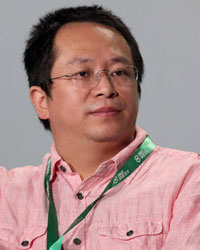Economy
Learning from wolves to fight lions
(Xinhua)
Updated: 2010-09-01 15:17
 |
Large Medium Small |
Reclaiming Lost Ground
For thousands of years, Chinese scholars were at the cutting edge of ingenuity -- inventing gunpowder, printing, cast iron, the compass and the chain suspension bridge -- before the torch of innovation seemed to pass to the West in the 1600s.
The failure of China's modern inventors to reclaim their history-making legacy was the subject of debate at the China Internet Conference (CIC) held from Aug 17 to 19 in Beijing.
 |
|
Liu Shuang, CEO of ifeng.com. [Photo/CFP] |
"I don't think that Chinese people lack imagination and creativity, but they need a special kind of social soil and culture," Liu said.
Zhou Hongren, executive vice chairman of the Advisory Committee for State Informatization under the State Council, the Cabinet, said, "A lack of core technologies is a prominent problem in upgrading China's economy."
Ninety percent of personal computers' CPUs and basic software in China had to be imported, Zhou said at a press conference on Aug 19, quoting a CASS blue paper on China's application of information technology.
In hardware, the record was just as discomforting.
China had to import all of its optical fiber manufacturing facilities, more than 80 percent of integrated circuit manufacturing equipment and 70 percent of digitally controlled machines, said Lai Ming, a member of the Standing Committee of the 11th Chinese People's Political Consultative Conference (CPPCC) National Committee, at a plenary session on June 23.
"A lack of independent innovation is a key obstacle restraining Chinese enterprises' rise up the value chain," said Lai.
Learning to love failure Successful high-tech companies such as Huawei remain rare exceptions in China. For all their determination to become innovators, most Chinese firms struggle to design cutting-edge products comparable to those dreamed up in the West and Japan.
 |
|
Zhou Hongyi, chairman of Qihu360. [Photo/CFP] |
In China, it is not uncommon for a researcher to be sidelined by their boss and see their prospects of promotion dwindle if he ends up empty-handed after spending money and time on a research and development project, said Zhou.
Zhou and Chen recommend enterprises and institutes take a long-term view of researchers' failures and change the generally adopted reward system in which each result is taken as the sole criteria of success.
China's education system also stymied innovation with its discouragement of critical thinking and promotion of conformity as a virtue, says Chen, who would like a system that nurtures critical thinking.
|
||||
This explains why Huawei incorporated into its core values the concept of "always strive to be the better," he says.
Teamwork was also the foundation of great innovations, says Chen, citing the iPod, iPhone and iPad as examples of organizational innovation.In Huawei, every employee must remember "We can only succeed through teamwork," just as a lone wolf can never beat a lion.



